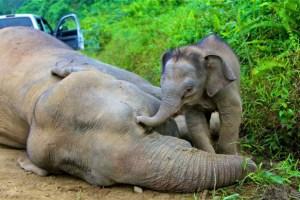 Cross posted from Al Jazeera
Cross posted from Al Jazeera
Four endangered pygmy elephants have been found dead in Malaysia, adding to the 10 carcasses discovered earlier this month, according to wildlife officials.
Laurentius Ambu, the wildlife department director of the Malaysian state of Sabah on Borneo island, told the AFP news agency on Wednesday that probably the elephants had ingested poison spread by oil palm plantation workers to keep “pests” from eating the palm fruit.
Ambu told Al Jazeera that more carcasses could turn up, since the elephants usually travel in herds numbering up to dozens.
“I have a hunch there may be more dead animals,” he said, adding that wildlife department staff were combing the area. “I don’t think it’s an accident,” he earlier told AFP.
Ambu said the three highly decomposed carcasses were found in Sabah’s remote Gunung Rara Forest Reserve, not far from where officials found the 10 other dead pygmy elephants, a rare sub-species of the Asian elephant. All the animals were found within a 10-square-kilometre radius, he said.
A preliminary post-morterm showed bloating in the gastrointestinal area, and bleeding from the nose and mouth.
Masidi Manjun, the state’s tourism minister, confirmed the number of elephants killed, saying that while authorities suspected that they had been poisoned, they were still awaiting a final chemical report.
On Tuesday, state officials released photos of the original 10 pachyderms, including one of a baby elephant nuzzling its dead mother.
Ambu confirmed that the young elephant has remained unharmed and has been taken to a wildlife park in the state.
He told Al Jazeera that the six-month old elephant was “responding quite positively” to treatment, and that she still had some dry skin and abrasions.
Forest conversion
The chemists’ report on the 14 dead animals is due to be issued next week and could reveal the cause of their deaths.
Recent reports suggest that all the deaths have occurred in areas where forests are being converted into plantations within the country’s permanent forest reserves.
According to the WWF-Malaysia, an estimated 1,200 Borneo pygmy elephants, which are smaller and have more rounded features than full-sized Asian elephants, are left in the wild.
In a statement, Dr Dionysius S K Sharma, WWF-Malaysia’s executive director, said: “Conversions result in fragmentation of the forests, which in turn results in loss of natural habitat for elephant herds, thus forcing them to find alternative food and space, putting humans and wildlife in direct conflict.”
“Frequent and large scale patrolling is critical to avoid such conflict from happening again. However, given the vast area that requires patrolling, it is a massive task for the Sabah Wildlife Department. More resources, including manpower, hardware and finances, should be allocated for the department,” he said.

